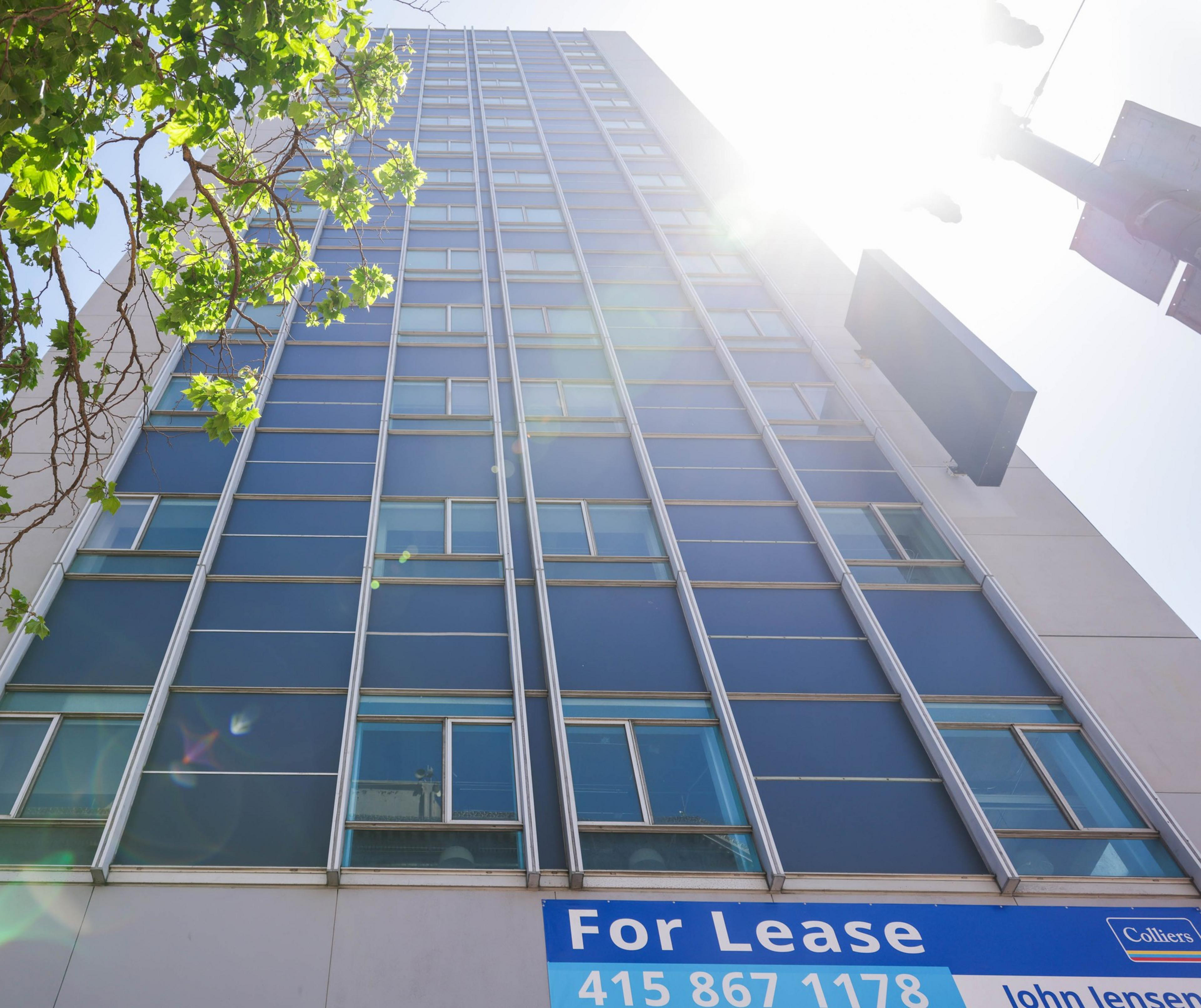To hear it from LendingClub CEO Scott Sanborn, his company’s impending $74.5 million purchase of an office building at 88 Kearny St. is the result of lucky timing.
“The expiration of our lease [at 595 Market St.] coincided with historically low San Francisco commercial real estate pricing,” Sanborn said. Turns out there’s no bad time for a good deal.
The tech-forward financial services company wanted to keep its headquarters in the city, where its logo looms over Second and Market streets. But rather than sign another lease, Sanborn and his team saw a chance to own prime real estate at roughly the same price.
Buying rather than renting means LendingClub’s new offices are listed as an asset on its balance sheet as opposed to a recurring expense, according to CFO Drew LaBenne. Plus, as a publicly traded bank, LendingClub can borrow at a more favorable rate than a traditional real estate operator. The idea is that once office demand (and rents) start climbing again, the company can keep those gains as the property owner and landlord.
Other companies with the wherewithal — and the cash — are also finding San Francisco to be a buyer’s market.
In January, both Hearst Corp. (at 450 Sansome St.) and Empire Records (at One Montgomery St.) closed on buildings in the Financial District for steeply discounted prices to occupy them as their local headquarters. In real estate circles, this class of buyer is called the “owner-user.”
This phenomenon does not occur only during down cycles. In 2012, Dolby Laboratories purchased 1275 Market St. (opens in new tab) in Mid-Market for $109.8 million, more than double the price the sellers had paid for the 385,000-square-foot building the year before.
But more owner-users are likely to emerge when many properties are trading for significantly less than their peak values, says Kyle Kovac of CBRE, who, alongside partner Michael Taquino, represented the sellers of 88 Kearny and 450 Sansome.
In addition to those deals, Kovac and Taquino brokered the sale of 995 Market St. to owner-user Berlinhouse for $10.3 million in January and a 12-acre campus in Emeryville to Sutter Health for $450 million in February.
“Sellers know where the pricing is now,” Kovac said. “Expectations are realistic. In the beginning of the pandemic, they were still fishing [for better returns] and taking properties off the market if they didn’t like the price.”
The rock-bottom prices are even attracting a surprising type of real estate player: nonprofits. In February, a partnership of the Community Arts Stabilization Trust and KALW Public Media bought the historic Warfield Building at 988 Market St. for $7.3 million, with the intention of turning it into an arts hub. KALW will occupy two of the building’s nine floors, where it will house its broadcast studios.


In other properties, the trend is taking a different form. Chris Freise of Redco Development purchased 300 California St. and 400 Montgomery St. separately last year with the help of a cash injection from some tenants, like GCI General Contractors, which bought an ownership stake as the sale was coming together.
These tenants are still liable for monthly rent payments, but if they are investors, they also get a cut of the building’s income each year. “It’s not mandatory by any means, but it’s a nice carrot you can offer that creates a win-win for the landlord and tenant,” Freise said.
But bargain opportunities may be closing for this pool of resourceful locals. This month, local developer DivcoWest and global investment giant Blackstone spent $111.3 million on 300 Howard St.
Institutional investors like Blackstone paid top-dollar for San Francisco offices before the pandemic but had been mostly sidelined as property values and investments cratered in recent years.
In the coming weeks, a partnership of Flynn Properties and a New York-based investment group is expected to close on the 745,000 square foot Market Center complex, according to a source familiar with the deal. Last year, other institutional investors, including New York Life and Barings, bought back into the San Francisco office market.
Ironically, it was a class of San Francisco owner-users themselves that spurred the current commercial reset. When buildings first started changing hands again in 2023, it was Gap (at 1 Harrison St.), Wells Fargo (at 550 California St.), State Bar of California (at 180 Howard St.), and the Mitsubishi UFJ Financial Group (at 350 California St.) that offloaded their properties at a discount — helping set the market’s new price range.
LendingClub, for its part, will spend the next year renovating 88 Kearny, which was constructed in 1986, to accommodate its roughly 400 San Francisco-based employees. Like other downtown firms trying to attract workers back into the office, the company intends to build modern meeting rooms and common areas.
Sanborn said the company will move by next spring and occupy 100,000 square feet in the building, slightly less than under its current lease, at 595 Market St. The remaining 133,887 square feet at 88 Kearny will be leased to existing and new tenants.
The momentum has begun. Last month, database company MongoDB leased 14,000 square feet in the building.

